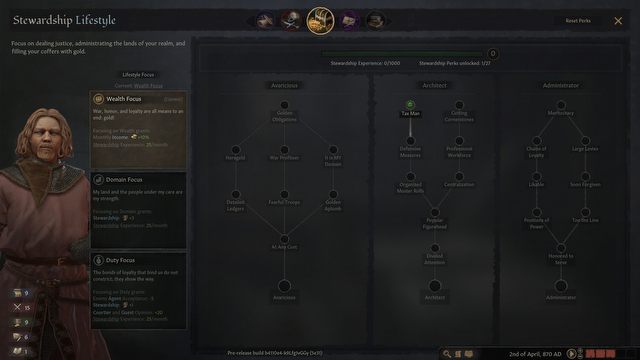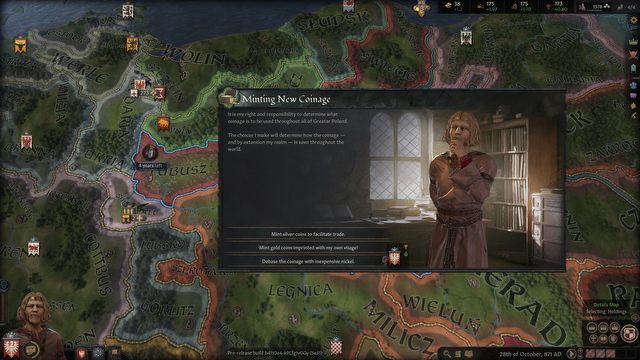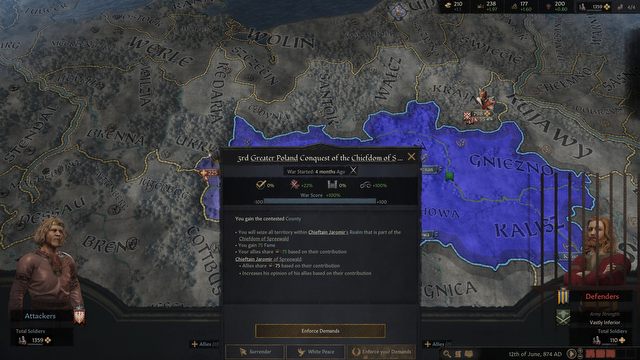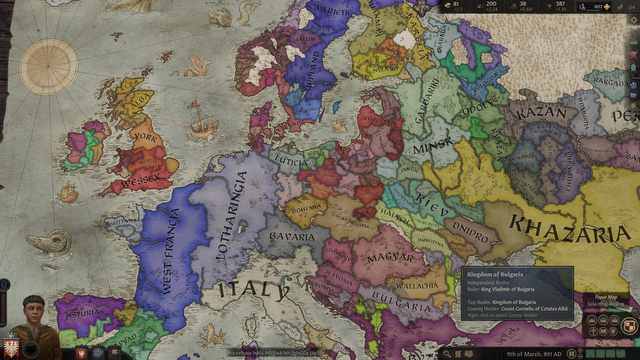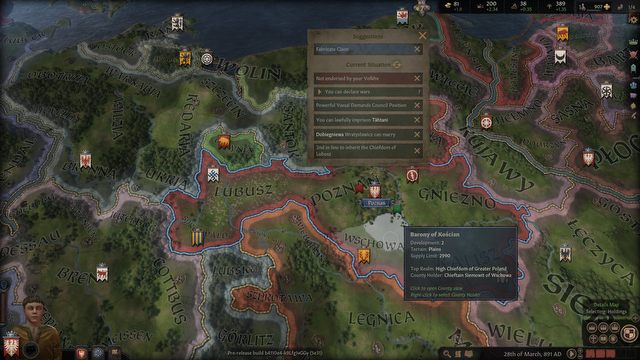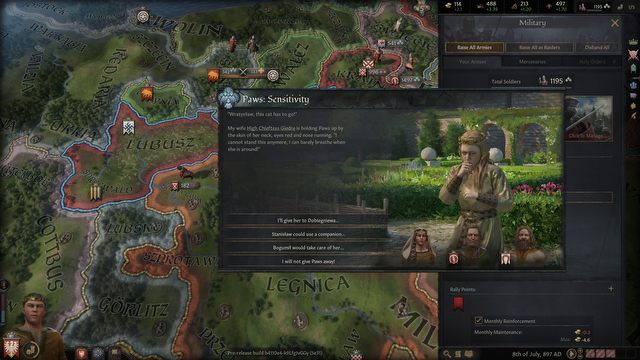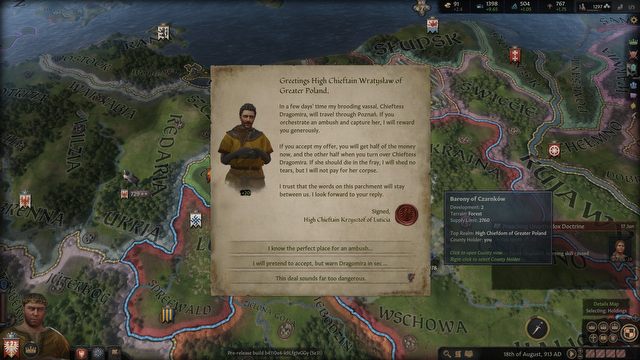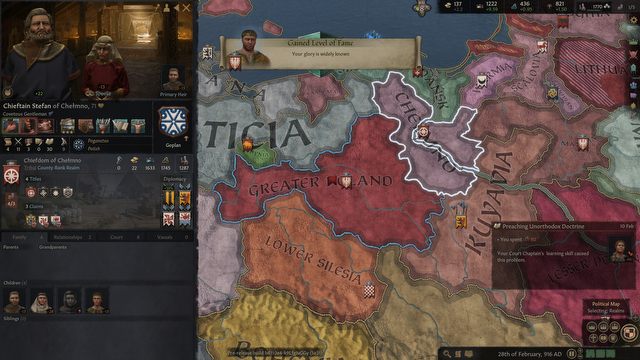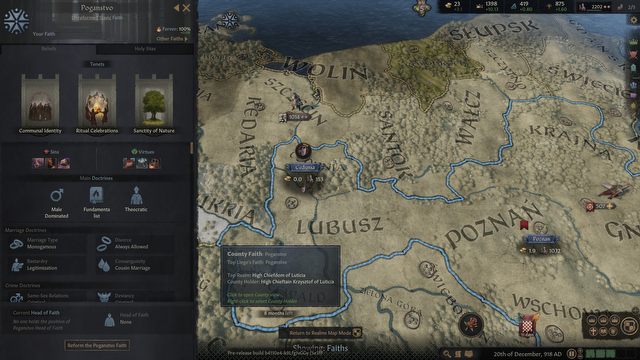Crusader Kings 3 – Cat Killed My Wife, I Was Thrilled
I've spent 10 hours with the newest Crusader Kings, which was supposed to reach people for whom the "two" wasn't accessible enough. Is it easier? It's a difficult question.
- seemingly more accessible than the previous part;
- beautiful map;
- fantastic character models;
- music and art;
- revised interface;
- new mechanics such as stress or religion.
- still high entry threshold;
- lack of many mechanics from the previous entry
Games are difficult in different ways. There's Darkest-Dungeon hard, where you can lose your team of top fighters in a matter of minutes – whereas getting that team together took 15 hours. There are difficult games like Sekiro, where you take on the monkey boss dozens of times only to see his headless body rise to fight on. And finally, there's a level of difficulty out of this world, and the prime example of this is the Crusader Kings series. The entry threshold is so high that it's not a game you can "just start playing" – this is a game you have to prepare for. You'll likely end up watching YouTube tutorials and perusing the Internet for advice. There's an anecdote I remember about quite a prominent reviewer, who only learned that building is possible in the game after he had reviewed Crusader Kings 2. These are not games you can approach without making sure you have enough of time and energy.
It was always the level of difficulty, as well as the slew of additions and updates that always seemed to put people off this series. Hard data is hard to obtain, of course, but the creators themselves have admitted that in the case of the new installment, they are aiming for those people who always wanted to play CK2, but bounced off. Well, I'm one of those people. I've recently spent 10 hours with an early version of CK3 and I think I already have plans for this fall.
Personal history
Is it possible to spend thousands of a game from a certain studio and be completely unable to derive any pleasure from playing their other games? It would be no exaggeration to say that the works of Paradox have accompanied me since I was a kid. I played Europa Universalis so hard (mainly one and two, I also spent many hours on the spin-off the Crown of the North); I also played a lot of the first Crusader Kings, but since I preferred wars to marriages, I always favored the EU series. Then came the other great strategies from the Swedes – some of them I played (Hearts of Iron 1 and 2, the magnificent Stellaris) and others I missed (EU3).
One of those Paradox games I missed is Crusader Kings 2. I've even had a few attempts at it, but I think I spent more time watching tips on YouTube than playing. The last time I skidded offCK2 was this year – shortly after it switched to a free-to-play. I decided to play one of the Irish families and I strongly advise everyone against it. The Irish, man... I mean... I just gave up.
But I promised myself that I would give this series another chance – is there a better time to start an adventure with such a game than the very beginning of its life cycle? When the game doesn't come with a load of years' worth of additions and expansions, which are of course welcome by the old guard, but which at the same time create wall that's hard to break for newcomers. I decided to check it out and it seems to me – because after 10 hours I can't be entirely sure yet – that things are much, much better now.
So, this article won't be just a collection of info about Crusader Kings 3. It's addressed to people like me – who have an issue with the series, and have been wondering whether it's worth it this time around.
PARADOX R WORLD CHAMPIONS
Crusader Kings 3 will replace the wildly extensive number two. However, if you were hoping that the "three" would incorporate all the solutions introduced in the previous installment, you may be surprised. Paradox is a company that has mastered two things – first, the nearly life-long support and monetization of its single-player titles, and second, obviously, the creation of great strategy games – what's funny is that they don't really have any competition in either.
To buy all available extensions to Crusader Kings 2, you have to spend above $100. You can certainly settle for a less extensive version (which still will be huge), but that price should give you an idea of what we're dealing with. Fortunately, the Swedes provide unwavering support throughout years for regular payments (in CK2's case it's been eight years – many MMOs are barely alive after this amount of time), free updates and tons of new content. Nothing is free, but Paradox at least guarantees quality – even the not-so-popular Emperor Rome delivers.
WHAT'S NEW AND WHAT'S MISSING IN CK3
- You will be able to create your own religion,
- but there's no trade.
- There's mechanics of character stress,
- there will be no naval battles.
- Your hero will receive a great tree to develop their skills,
- but you won't be able to play as papacy or republics at the start.
- There will be no equipment nor the Silk Road,
- instead, the mechanics of stress can drive your characters into sex addiction.
Si vis pacem, para bellum
In Crusader Kings 3, I went for the Piast dynasty, to ensure myself world dominance according to Mackinder's theory of heartland. The game can start in year 867 or, the more famous and significant, 1066 – I opted for the former because I wanted to see my tribes unite (or perish in attempt), and Christianity slowly become the dominant religion (or not, depending on my decisions).
For the several decades of my rule, my people fared quite well. I won quite a few wars. I was rather surprised at how easy it was to spur a conflict, and then end it with gaining new subjects under my rule. I also had no problems taking the land away from one of my vassals. Stefan, the ruler of Cedynia, has always been my enemy – he conspired when my ruler was underage and then made life difficult for me. So I required the high priest to falsify evidence of my rights to Stephen's title, and then I took everything from him! It was jolly fun. Fortunately, there was no civil war. It's hard to say whether this was just a matter of my luck or the laws that allow more aggression in this early period – but at times, I felt like I was playing Europa Universalis rather than Crusader Kings. You seek the casus belli, attack the enemy when he leaves a powerful alliance, and then incorporate his lands into your state. Dead simple.
I like the new stress mechanics, too. Every negative event in our character's life has more or less impact on their psyche. When the anger bar fills up, the unfortunate person will try to find a way to deal with the emotions – by simply writing a journal in the best case, and in slightly worse instances, excessive drinking and tormenting everyone around them (our enemies can take advantage of that, of course). If the stress continues to increase (it can reach three levels), our character risks falling into the abyss of madness, which can push them, for example, to, I shit you not, strangle their own children. One of my rulers, Wratislaw, just started frequenting the brothel...
Real RPG
If you like role-playing games, you'll love Crusader Kings. However, if your favorite RPG is The Witcher 3 (an otherwise good game), then sorry, but you might be surprised with CK. Why? Because the essence here is actual role-playing – something the Polish RPG, and in fact, many other triple-A action RPGs, is only miserably mimicking. . Crusader Kings is a game for fans of table-top RPGs, in which you have to invent the story and characters yourself, and they're only as interesting as you make them.
In Crusader Kings, you really need a rich imagination to enjoy the quality entertainment hidden behind the seemingly opaque and overly technical description of characters, their statistics or various events. So if you like to come up with your own stories, CK will give you the foundation to create stories about mad kings, cruel poisoners of children or... cannibals. In this respect, the series is much closer than the aforementioned Witcher to the essence of what an RPG actually is.
How does this look in practice? In Crusader Kings 3, my first ruler got into a kind of mania – he became fixated on catching a white deer that had eluded him on one of the hunts (this is a mechanic known from the previous entry). This wish became an obsession that dominated his life, often affecting character statistics negatively, but it sure was more interesting to watch than painstaking grind of points needed for the development of a province or army.
Wratislaw, the son of this hunting aficionado, proved to be an excellent ruler – although he took the crown over at only 7 years old, he survived, grew up and proved to be an able administrator. However, after 30 years of rule, another disturbing thought took hold in his own head – he craved human meat. In theory, I could have prevented that from happening, but curiosity took over. Unfortunately, by the time I had a chance to learn anything, I ran out of time, but you can see that in Crusader Kings, you have to balance between the sensible development of your dynasty and the edgy play to create memorable stories. .
Does that mean that minimaxers or people keen on development or economics have nothing to look for in CK3? Definitely not, but then there are other games from Paradox that are much better for exactly that. Crusader Kings is a game about humans first (there are about 20,000 characters), and a strategy second.
"I've never played CK – is this a good moment to start?"
That's the question I've been looking to answer myself. I spent a lot of time with the first entry, but that was a dozen years ago. I approached the next one a few times, but to no avail. However, this limited experience was enough to know what I was doing in CK3.
Above all, the interface has been greatly improved. The main tool we use is a special widget where suggestions are made about what we can or should do. There, you can find information that was hidden in different areas of the interface – about the titles we can inherit, or about characters we can put in a darkroom, or in prison.
Control freaks probably won't be happy that the developers do not plan to provide more extensive options for managing this widget – when asked if such a feature would appear, they replied that no, but the system is supposed to work smoothly. And indeed, during my brief encounter with the game, this panel has been useful, but I suspect it will find as many supporters as critics. It reminded about the relatives I could get married, lands I could plunder (and here, the tips were sort of useless – I know I can attack my neighbor, but his army is twice as large, so), or about whom I could declare war on at any given moment. It's a small, powerful tool. Particularly to a less experienced player.
The developers also bragged about the new hint system. You can hover over a highlighted word, and so prompt an explanation window, which will lock on-screen after a while. You can then hover over another word there, hence opening another window. This is an intuitive way that actually makes it possible to quickly understand the secrets of the game. Then, there's the extensive encyclopedia, full of detailed explanations. It's obviously support for new players that the old guard won't need very often, but Paradox definitely worked on making Crusader Kings 3 more accessible.
WHAT ABOUT THE CRUSADES?
Of course, there can be no shortage of crusades in Crusader Kings 3. The main difference in the new game is that these will no longer be available to Catholics only, but also to followers of other religions.
Five hours of tutorials and I still can't play
As I wrote in the introduction – I love Paradox games. But I lack the time to keep up with them. Exactly four years ago, I wrote a review of Stellaris, then I put the game on hold for a while. When I went back a few times later, I painfully realized I couldn't play the game anymore. And I reviewed it! Seems absurd, but not in the case of Paradox. After a ton of big updates, changes and tweaks, Stellaris is no longer the same game it was at the time of launch – it's much better.
Will Crusader Kings 3 have the same problem? It's hard for me to imagine it would be different this time around. In September, we will get the basic version of this game, and it's bound to receive both free updates and paid extensions over the coming years. You can safely assume there will be trade, governing the republics or the papacy, as well as the management of equipment or expansions focusing on the Far East. The launch version of the CK3, however, should be quite accessible for new players.
DO YOU LIKE VIKINGS? THIS WILL BE YOUR YEAR
2020 will be the year of the Viking. There will be some games in which we will be able to learn more about the fury of the Normans, the history of early medieval England or the effectiveness of the Viking weapons. The two biggest are, of course, Assassin's Creed: Valhalla and Crusader Kings 3.
Middle Ages are beautiful
I had the best time with Crusader Kings 3 – although I barely scratched the surface. I am a visual artist, so I have no doubt that my feelings were influenced not only by the substantive aspect, but also by the excellent visual setting. CK3 is a lovely game – the artworks in the loading screens are beautiful, and the atmospheric music beautifully completes the whole. The icing on the cake, of course, are the great character portraits. This time they're animated – our characters cough when they're sick, or extend their hands in a begging gesture when they ask for mercy.
In the decades I spent in the Mitteleuropa I came across a cannibal ruler, I had a cat who killed my fair wife, and the young ruler was bullied by older colleagues. I waged wars and plotted intrigues. Now I know Crusader Kings 3 can steal a lot of my time in fall. I'm waiting.
ABOUT THE AUTHOR
I like big strategy games, although nowadays, I don't always have as much time for them as I would like. All the more so, I'm happy that Crusader Kings 3 didn't intimidate me with the interface and I figured out my bearings quickly. CK3 is on my must-have list.
